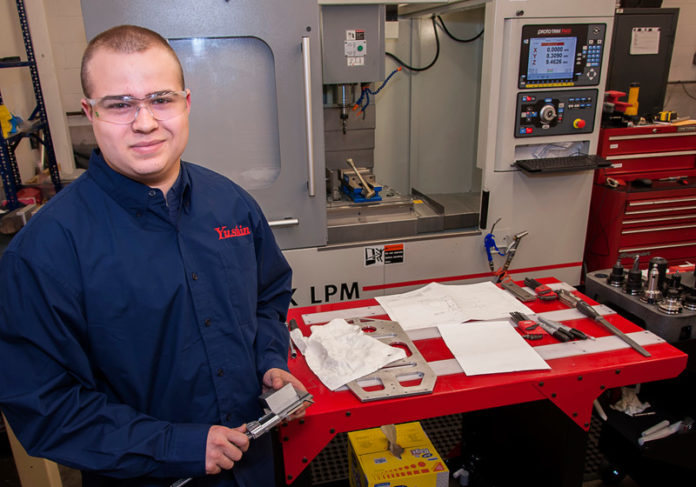
Guill Tool & Engineering Inc. of West Warwick makes nuclear-propulsion-system components for the U.S. Navy and tools used to extrude, or shape, polymers and plastics by pushing them through a die.
About 30 computer numerical control machinists do this work today, but two may retire this year, and in addition to replacing them, three more are needed because of the business’ growth, said Chuck Paull, chief operating officer.
That’s where a new state CNC Machinist Registered Apprenticeship Program for CNC operators comes in.
“It can’t come fast enough,” said Paull, “and the key to the whole thing is, prior to these new programs, the education community was behind the times as far as what we needed for educated machinists. The machine technology changes so fast. These new apprenticeship programs are filling that gap of coming up to date with the latest training. At least it’s a start.”
The purported “skills gap” is strongly felt in advanced manufacturing today, company representatives say.
“The CNC machinists out there are getting closer to retirement and have gone through the whole progression of machining … from using calipers to computers, from ruler to digital interface,” said Harsha Prakash, director of the Polaris Manufacturing Extension Partnership center, formerly known as RIMES, which is helping run the new program.
“They learned it as the new machines came out,” he said. “[But] the workforce coming in need[s] to have basic programming skills in line with the new technology. That’s where there’s been some roughness in getting the new workforce integrated.”
The launch in mid-May of this new advanced-manufacturing apprenticeship program is attracting Guill Tool and other employers (sign-ups for employers begin on June 15), but could attract even more firms if hiring language in an agreement form that parties sign is revised, some proponents say.
Formally announced by Gov. Lincoln D. Chafee on May 15, the new program would provide competency through classroom education and proficiency through on-the-job training with computer numerical control apprentices who sign agreements to work with employers, said Prakash.
Two new certificate programs at the Community College of Rhode Island and the training by manufacturers are designed to take up to four years, though talented apprentices could move ahead on an accelerated schedule, he said.
Apprentices who register get the benefit of a recognizable credential statewide, Prakash said.
But the agreement to be signed by the apprentice and employer and filed with the R.I. Department of Labor and Training contains language that would require “just cause” termination instead of the more standard “at will” termination, and that has given pause to some manufacturers who might otherwise participate in the program.
“We’re making progress, but from the perspective of some manufacturers, we’re not quite there,” said Scot Jones, CEO of Groov-Pin Corp. in Smithfield. “The specific language of the agreement is something we’re reviewing and we’ve requested certain changes.”
Prakash said the same agreement form is used for all of the R.I. Department of Labor and Training’s 27 apprenticeship programs, and that DLT’s Bernard Treml, supervisor of apprenticeship, was already revising them to be compliant with changes on the federal level.
Treml confirmed that, saying he believes the changes will satisfy employers’ concerns.
“It has been totally revised and will go before the R.I. Apprenticeship Council on [May] 27,” Treml said. “The language has changed to conform with nontraditional trade apprenticeship programs.”
Another issue involves fees the employers are charged – $120 for companies to register as a sponsor for the program and $24 for each apprentice they hire. While not onerous, the fees are still an add-on, when many manufacturers have their own internal training programs or internships, which they consider comparable and for which they are not charged, said Dave Chenevert, president of Swissline Precision Manufacturing, Inc., in Cumberland.
Bill McCourt, executive director of the Rhode Island Manufacturers Association, as well as Chenevert and Jones, were involved in shaping the new program and say they still see merit in it.
“There’s that newness on the employer side,” McCourt added. “And this is the beginning of a program, so you’re not going to pull it out of the box and have it be perfect. It’s going to develop over time.”
Nordson EFD LLC of East Providence has an aging machinist workforce and desperately needs the apprentices this program would provide, said Stephanie Arpin, supervisor of human resources.
“I do not have concern about it because from what I’ve been told [by Treml] we can manage the performance of the apprentices as we would any of our employees,” Arpin said.
The work process Nordson has outlined is rigorous, with mastery of skills required on four levels for every 2,000 hours of training, she said.
“We’ve got it completely mapped out,” Arpin explained.
Two boot camps running May 19 to July 2 and July 7 to Aug. 21 are filled, with 18 in the first section and 16 in the second, said Prakash and Jerry Bernardini, professor of electrical engineering and chairman of the Engineering and Technology Department at the Community College of Rhode Island. The school and some state funding are covering the cost so that students can screen themselves and see if advanced manufacturing is a fit for them career-wise, they said.
CCRI just introduced the two certificate programs for the CNC curriculum in October, Bernardini added.
“My hope is enough manufacturers will see a value in [the apprenticeship program] and it will essentially reinvigorate manufacturing in Rhode Island and have an effective way of transferring the knowledge of older employees who are retiring,” he said. “We’re going to do this no matter what. CCRI is committed to this program. We think it has a lot of value.”
Like Nordson, Yushin America in Cranston believes the apprenticeship program provides the combination of classroom and hands-on training employers are looking for, according to Karen Paolucci, a human resources manager.
She pointed to Dalton Fontaine, 19, a CNC machinist who lives in Swansea, Mass., and got his training at Diamond Regional Vocational Technical High School in Fall River.
“I had to go to Massachusetts to get that,” she said. “Now, we’ll be training candidates in the state of Rhode Island.”
“It’s pretty gratifying looking at the end result when you finish a part,” Fontaine said, describing the work. “You can say, ‘Wow, this was a block of steel at one point and now it’s a finished part that does something useful.” •












